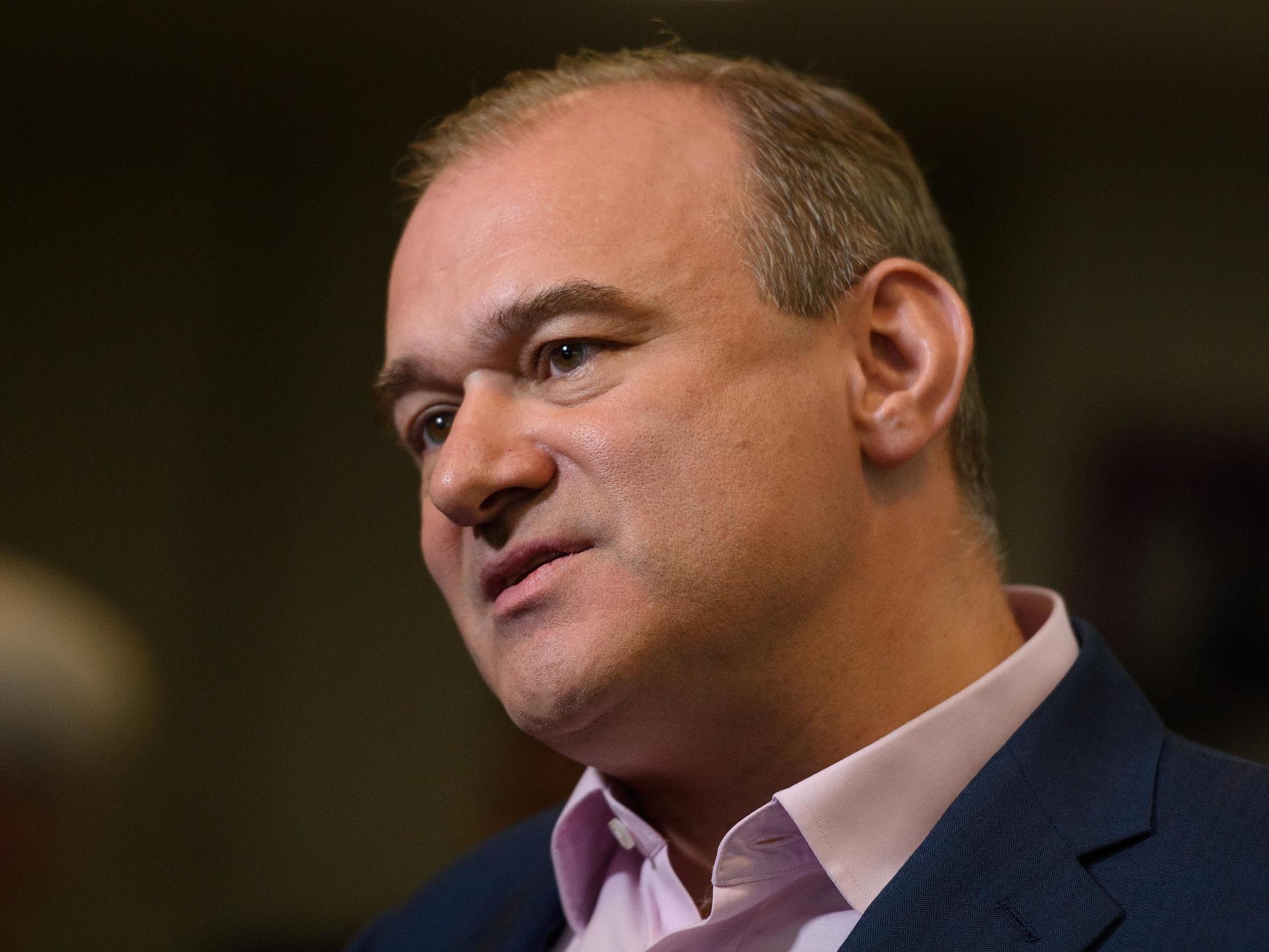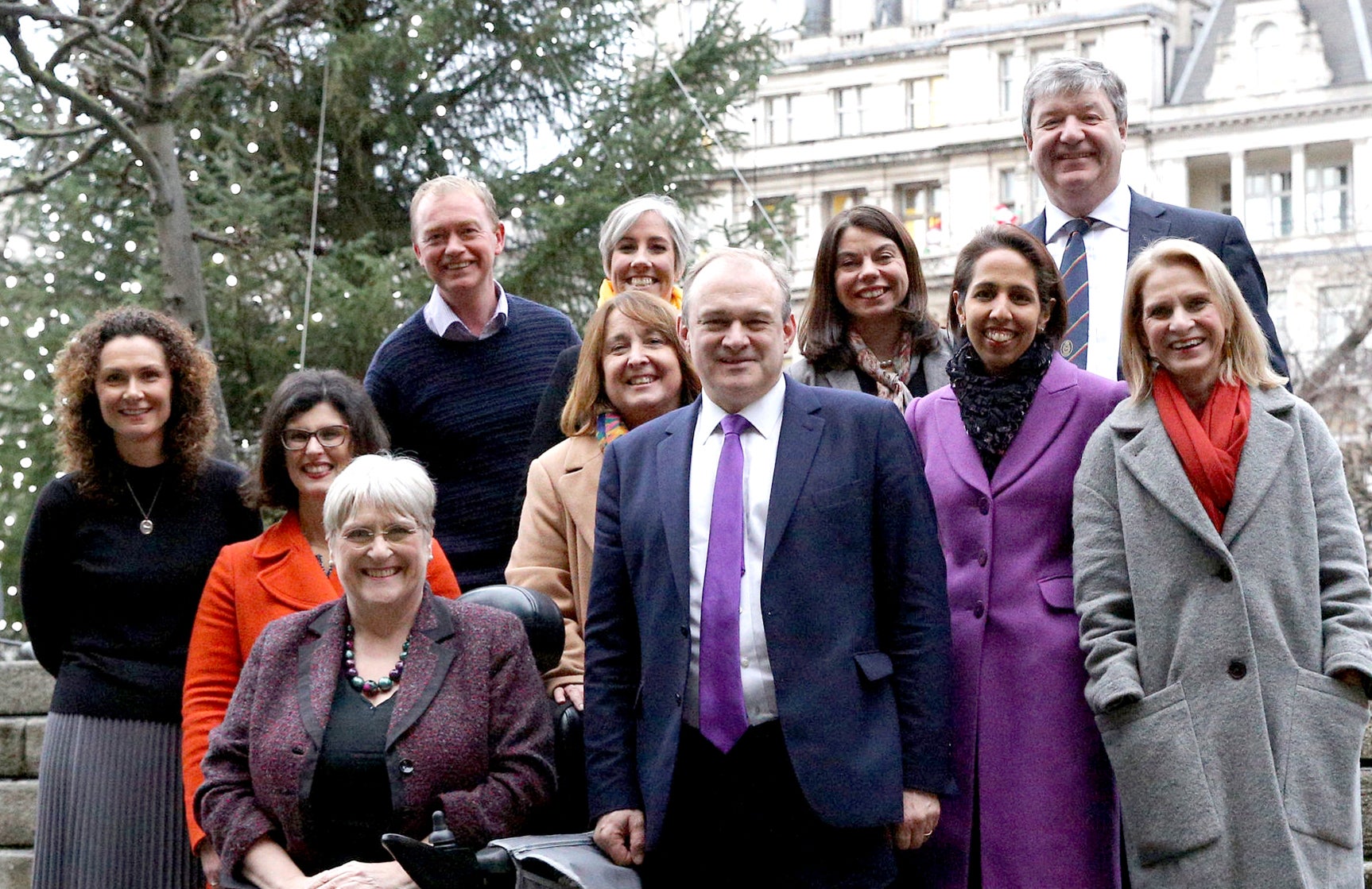Boris Johnson must call out Donald Trump for police brutality towards protesters and journalists, acting Lib Dem leader says
Exclusive: Ed Davey kicks off leadership campaign with call for PM to stand up for ‘fundamental democratic values’

Boris Johnson must call out Donald Trump publicly for the police brutality towards protesters and journalists reporting on demonstrations over the death of George Floyd, acting Liberal Democrat leader Ed Davey has said.
In a letter to the prime minister, Davey said Johnson’s unwillingness to “speak truth to power” exposed the current imbalance in the UK’s historic special relationship with the US.
Speaking to The Independent shortly after formally launching his bid to take the leadership role on a permanent basis, he said the PM’s mishandling of trade talks with the EU had left him “pinned in a corner” and desperate not to fall out with Trump.
While Mr Johnson has said he was “appalled” by the killing of Floyd and the UK embassy in Washington has discreetly raised the issue of British journalists being impeded by police from covering protests, the PM is yet to speak out against the US president’s incendiary and heavy-handed response.
In his letter, Davey said: “If this series of events were happening in any other country, UK government would not only be calling out such behaviour, it would be using diplomatic channels and international pressure to stop this violence.
“Both protestors and journalists have had their freedoms curtailed by an administration led by a president who has been using his high office as a bully pulpit, inciting more violence.”
And he told Johnson: “You have spoken previously of your pride in Britain’s place in the world, but that pride means nothing if we are not willing to stand up when we see fundamental democratic values being infringed, especially coming from one of our closest allies.”
Davey said the failure to hold Trump to account was part of a pattern of behaviour in which Brexit “hotheads” in government, led by Mr Johnson and his under-fire aide Dominic Cummings, were forced to curry favour with the US president on issues like ditching the ban on imports of chlorine-washed chicken because of their determination to cut the UK’s ties with Europe.
“Johnson has pinned himself into a corner over the deal with the European Union,” he told The Independent. “By doing that, he is going to lose out and lose out for Britain and therefore be even more desperate for trade deals elsewhere and pay too high a price to get deals that aren’t good enough. That’s a very poor position for any prime minister.”
While insisting he did not want to simply reopen the old battles over Brexit, Davey said that the social and economic disruption of the coronavirus outbreak made it “common sense” for Britain to seek the longest possible extension to the transition out of the EU in order to forge the closest possible relationship with its former partners.
Instead, some around Mr Johnson appeared to be hoping to smuggle a no-deal outcome through under the cloak of the Covid crisis in the “reckless and irresponsible” hope that the economic damage inflicted by new trade barriers will be hidden by the impact of the virus, he said.

Voters increasingly alarmed by the impact of coronavirus on jobs and livelihoods need to see the government prioritising maintaining trade links with Europe rather than chasing the “tiny” gains on offer from a US deal, he said. And he said chancellor Rishi Sunak’s expected emergency budget in July should deliver a “radical” shift in focus towards economic recovery based on “decarbonising capitalism”.
A “green recovery plan” should pump money into jobs-rich programmes like home insulation to supply a quick boost to jobs and economic activity, but should also encompass fundamental reforms to the financial sector to make London the “green financial capital of the world”, said Sir Ed.
“If they try to do it by simply changing spending allocations, that won’t be enough,” he said. “They need to go deeper and look at the rules of the game for private capital. It must signal that this is a massive moment of transition, not a minor tweak of expenditures. It’s got to be big if it’s going to respond to the biggest crisis our economy has seen since probably the Second World War.”
Davey’s focus on green issues, and on what he terms a “caring revolution”, is an indication of his belief that after their disastrous performance on a “revoke Brexit” platform in December’s general election, the Lib Dems need to shake off the image of a single-issue party obsessed only with Europe.
“We haven’t as a party in my view connected in recent years with some of the concerns of the voters,” he said. “We need to talk about those mainstream issues.”
Central to this is his promise to raise the status of millions of people doing unpaid caring work, which he says is informed by his own experience of caring for his terminally ill mother and then arranging domiciliary care for his grandmother as a teenager, and raising with wife Emily their son John whose undiagnosed condition leaves him unable to walk, talk or dress himself at the age of 12.
In policy terms, this includes a commitment to a Citizen’s Basic Income to ensure that those unable to work due to caring responsibilities or the homeless or those without secure accommodation do not fall below a minimum level of support. While declining to put a figure on the payment, he said he anticipated something closer to £100 a week than the current carers’ allowance of £67.
In a leadership election in which the 54-year-old former cabinet minister and MP of 23 years’ standing is by far more experienced than rivals Layla Moran and Wera Hobhouse, who both entered parliament in 2017, Davey is hoping that these sorts of ideas will help overcome arguments that the party needs a new direction under a leader who is not tainted by coalition with the Tories.
“I’m the fresh start,” he said. “I’m the one talking about the new ideas like a caring revolution. That’s fresh, that’s new, that’s different.”
His stint as energy secretary in David Cameron’s coalition cabinet from 2012-15 should bolster, not undermine, his anti-Tory credentials, he suggested.
“I’m an anti-Conservative politician. I’ve fought the Conservatives all my life, in government and out of government, and I would take on the Tories as leader,” he said.
“I’ve always been a centre-left politician, a progressive politician. For me the party’s natural home is on the centre-left.”
He sidestepped the perennial question for all would-be Lib Dem leaders of whether he would plump for Johnson’s Tories or Keir Starmer’s Labour if he held the balance of power after an election.
But his preference for Starmer was plain as he credited him for putting Johnson “on the back foot” and recalled his offer of cooperation with the new Labour leader in holding the government to account.
Davey has previously said that Lib Dems suffered during Jeremy Corbyn’s time at the Labour helm from voters feeling they had to back Tories to keep the hard-left out. And he insisted that he does not expect an electoral squeeze from Starmer competing for the same centrist voters, saying it was important that the leader of the opposition was “someone who could be a credible prime minister”.
But for now his sights are set on the postal ballot of party supporters which opens on 30 July, with the new leader to be named on 26 August.
Join our commenting forum
Join thought-provoking conversations, follow other Independent readers and see their replies
27Comments